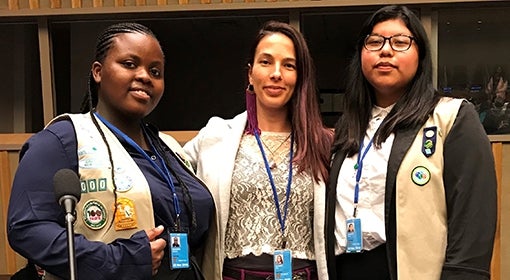 Making a Chinese dumpling is much harder than it looks—at least that’s what Anthony Gavazzi thought as he stood in a kitchen in Beijing, struggling to follow a cooking instructor’s lead. Working beside the Pitt junior political science and communications major was JieRen “Jax” Kou. He had grown up in China’s capital city and was now folding and twisting together the edges of his pork-filled dumpling with ease. The American visitor, on the other hand, was having much less success. Taking notice, Kou smiled and offered to share his technique. With his new friend’s help, Gavazzi began to get the hang of handling the dough and threw himself into the culinary challenge.
Making a Chinese dumpling is much harder than it looks—at least that’s what Anthony Gavazzi thought as he stood in a kitchen in Beijing, struggling to follow a cooking instructor’s lead. Working beside the Pitt junior political science and communications major was JieRen “Jax” Kou. He had grown up in China’s capital city and was now folding and twisting together the edges of his pork-filled dumpling with ease. The American visitor, on the other hand, was having much less success. Taking notice, Kou smiled and offered to share his technique. With his new friend’s help, Gavazzi began to get the hang of handling the dough and threw himself into the culinary challenge.
The two now laugh as they recall that dumpling-folding exercise. Besides having fun making and eating a meal together, they learned in delicious detail how something easy and familiar for one person can feel confusing and disorienting to another.
That’s a key lesson of Pitt to You, a yearlong mentorship program run by Pitt’s Asian Studies Center, Office of Residence Life, and Office of International Services. It involves 10 undergraduate mentors, like Gavazzi, who have been trained to serve as Pitt ambassadors. They travel to Beijing and Shanghai in the summer to work with about 50 incoming first-year students from China, many of whom have never been to Pittsburgh or the United States.
The program helps connect the new students to friends and resources at the University—but it offers something important to the Pitt mentors, too. It helps them understand the differences and challenges international students can face. The empathy cultivates a bedrock of friendship and support that the incoming students from China can lean on even before they make the exciting and potentially nerve-wracking leap to college life oceans and continents away from everything familiar.
“It’s important that the mentors make this connection of, ‘I just went for two weeks; I can’t imagine going for four years,’” says Lynn Kawaratani, assistant director of partnerships and programming at the Asian Studies Center.
Kawaratani was part of the team that founded Pitt to You, along with colleagues from Student Affairs. Now in its third year, the program stands out, Kawaratani says, because it fosters long-term connections through mentorship.
Each Chinese student is matched with a current Pitt student months before they meet in China, allowing mentors and mentees to start forming friendships early via videos and conversations on the Chinese social media platform WeChat. Then, during the summer visit to China, the mentees share their home country and culture with their mentors through activities like cooking lessons and city explorations, while the mentors share insider information about what life is like at Pitt.
By the time Gavazzi, Kou, and their peers reunited on the Pittsburgh campus, they didn’t see each other as strangers, but as friends united by shared experiences, helping hands—and varying levels of dumpling-making skills.
This article appeared in the Winter 2020 edition of Pitt Magazine.




